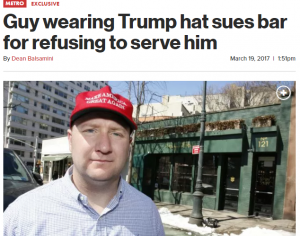There are no legal protections from discrimination in service based on political affiliation or expression
 A story in the New York Post raises an interesting legal point about allowable discrimination in small business management.
A story in the New York Post raises an interesting legal point about allowable discrimination in small business management.
When discussing the topic of discrimination in a small business setting it makes sense to first recognize the terms “legal discrimination and “illegal discrimination”. The importance of this point was hammered home for me years ago when I worked with a prominent black community leader in Philadelphia to repeated “we don’t tolerate any type of discrimination” and I had to repeatedly explain to him that every one of the city’s many employee benefit plans contained provisions for allowable discrimination. Yes, discrimination exists and is legal. Discrimination in providing business service is legal and allowable in any business situation except where protected by law.
Second, it is important to recognize that the definition of illegal discrimination change depending on jurisdictions that may protect additional groups of people. Under federal law, a business cannot deny service to someone because of his or her race, color, religion, national origin or disability. Also, in some places you also cannot discriminate against people because of their sexual orientation based on state or local law. But if there is no state, federal or local law prohibiting discrimination in public accommodations against a particular group of people, then the business can legally refuse to serve that group of people. There is no protection from discrimination of service on the basis of political affiliation or political opinion or political expression. It is legal to refuse to serve Trump supporters, or Obama supporters, or groups of sports fans, or whatever, as long as it is not a protected group. (This legal standard for providing service is different from employment law, for example, if the man wore his hat to a job interview and got the same treatment then this would be illegal under federal law).
It would appear that the case in the New York Post article is a nuisance lawsuit with no violation of federal or state law. The attorney’s best bet is to create another legal theory to support his claim but he cannot win on the basis of illegal discrimination. He should have known better that he has no basis for a legal claim over discrimination. Perhaps the bar owner can make a counter claim against the complainant to recover legal costs of defense and damages to his business reputation. As a practical matter, however, it is difficult for a business owner to recover the cost of a nuisance lawsuit.
I’ve discussed in my small business blog examples of allowable political discrimination strategies that may be appropriate. These tactics are used now in places like Philadelphia and New York City. Businesses should use this cautiously and sparingly but clearly there are situations where it helps. It is important to communicate management’s stance to employees and apply the practice consistently.
If the intent of the business is to make a statement that Trump supporters are not welcome then it is best to do so evenly and consistently to avoid the possible claim that the discrimination action was based on another legally protected basis.
In my clients’ businesses, for example, I’ve always made it clear that racist attitudes were not welcome and racists would not be welcome as customers. Over the past year I’ve expanded that position to prohibit serving people who espouse attitudes or repeat Trump statements about discrimination or threats against illegal immigrants. My new action extends the business service discrimination policy from protection of a legally protected class to an unprotected class, yet my legal right to do so is the same. I suppose that it is a bit tricky for some to understand the legal framework. I’ve even been falsely accused of harboring illegal immigrants by a local elected official who did not understand the legal or practical distinction and objected to my business operating policies on a crazy twist of logic. Discriminating against individuals who support the law is legal. Accusing a person engaged in legal discrimination of breaking the law that the banned person espouses is neither logical nor legal.
Over the past 30+ years in the practice of employee benefit plan design and general small business consulting I’ve run into many interesting situations involving legal and illegal discrimination practices of businesses. But we’ve not seen anything to prepare us for the backlash of the anti-Trump movement that has taken hold in metropolitan communities this year. We will see many more stories like this to come where Trump supporters are offended to learn that their business patronage is not welcome and their presence is considered a nuisance to be removed.


Leave a Reply